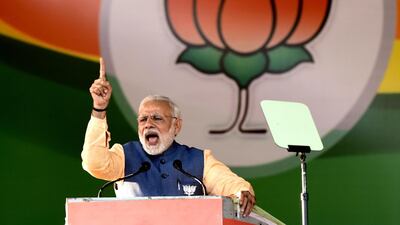India has one of the largest railway networks in the world and now it wants to put in place the largest public healthcare system.
It's a worthy aspiration but so far, the February 1 announcement goes no further than that. No one knows how the grandly named National Health Protection Scheme will be funded, structured, managed or made to work. Will the plan prove to be a bromide or a bracing change for half-a-billion Indians too poor or too far out in the hinterland to have access to the most basic healthcare?
There's no shortage of cheerleaders, though. India's finance minister Arun Jaitley has gone so far as to call the plan "Modicare" in tribute to his boss, prime minister Narendra Modi. But the transparent attempt to create some resonance with Obamacare, the nickname for the largest overhaul of the US healthcare system since the 1960s, is surely misleading and unwise. One can only hope the similarities between tomorrow's Modicare and the eight-year-old Obamacare extend no further than popular terminology and basic good intentions.
India cannot afford to doom one of the most important programmes it will ever run for its peoples’ health and wellbeing to the bitterness and uncertainty that has marked Obamacare.
Bouts of political squabbling in the US have periodically put Obamacare, officially known as the Patient Protection and Affordable Care Act, on life support. It staggers on at this point of time, despite disfiguring political cut and thrust. But it is sorely weakened, the guiding principle of basic health for all somehow lost in the white noise of political debate.
That said, Obamacare has some significant successes, not least the steady reduction of the percentage of Americans without health insurance to a thin sliver of the population. This has enabled poor Americans to get timely treatment for chronic diseases such as diabetes that are common, costly and either debilitating or fatal if left unaddressed. But overall, Obamacare can justifiably be said to be in indifferent health.
What of Modicare? As yet unborn, it obviously has no health profile, but its conceptual genes at least are good. Mr Modi’s government seems to be painfully aware that health care remains a dream too far for most Indians. This epiphany is laudable in a country that prides itself on its portrayal as an emerging superpower but has offered little in the way of social protection to its people. To give 40 per cent of India’s population the chance of basic healthcare would be a revolution without bloodshed and barricades. It is reminiscent of Rajiv Gandhi’s move to computerise Indian Railways in the 1980s, pulling India into the 20th century just as it was almost over.
_________________________
Read more from Opinion
Jonathan Cook: Fourteen-year-old Ghada was the latest victim of Israel's dehumanising machine
_________________________
Even so, Modicare comes with a health warning. This is the second time in his prime ministerial tenure that Mr Modi’s government has proposed a sweeping healthcare plan for the poor. The first – in 2016 – led to the Rashtriya Swasthya Bima Yojana, a barely funded, indifferently managed scheme. Experts such as Dipa Sinha, professor of economics at New Delhi’s Ambedkar University, say the RSBY two years on, “has neither managed to significantly reduce out-of-pocket expenditure nor has it increased access to healthcare for the poor.”
What makes the new proposal different is timing. It was announced in Mr Modi’s last budget before the 2019 general election, a sign that the governing party recognises the voters’ yearning for compassionate care and is anxious to be seen as delivering. To this end, the government has stoutly affirmed its determination to cover health care costs of up to $7,800 for 100 million poor families and spend some $188 million to create “health and wellness” centres. A new surtax, which will raise roughly $1.7 billion a year specifically for health care programmes, is supposed to show the seriousness of the Modicare endeavour.
This is encouraging but still too little for a scheme meant to be up and running a year from now, saving lives and limbs and impecunious families from the crushing burden of debt. India's budgetary allocation for health has long languished at just over one per cent of GDP (China spends three times as much) and there is little indication this might change any time soon. Unsurprisingly, India's largest national daily, The Times of India, described Modicare as "a tough ask".
And yet, it’s hard to see exactly why this is such a tough ask. Even Malawi, one of the world's worst-HIV-hit countries and with a GDP per capita of around $350, has managed to provide universal free health services. Tiny Costa Rica, with a much smaller economy than India, has a superb universal healthcare scheme. China, which has a bigger population than India, has created various health programmes to cover rural and urban areas and is now focused on harnessing technology to ensure access, affordability and quality. India doesn’t need Modicare, a branded health system, so much as care, period.


